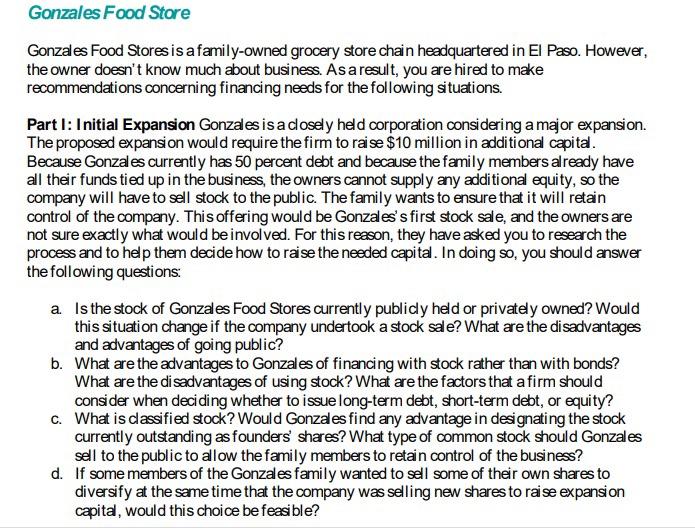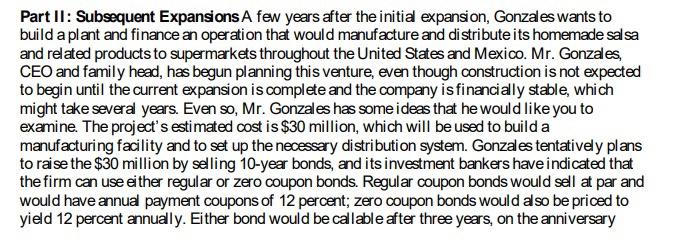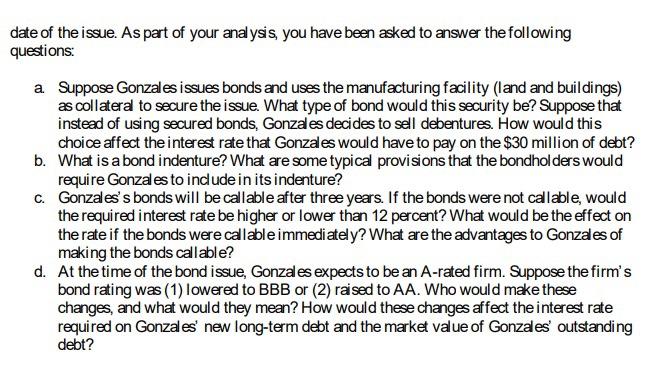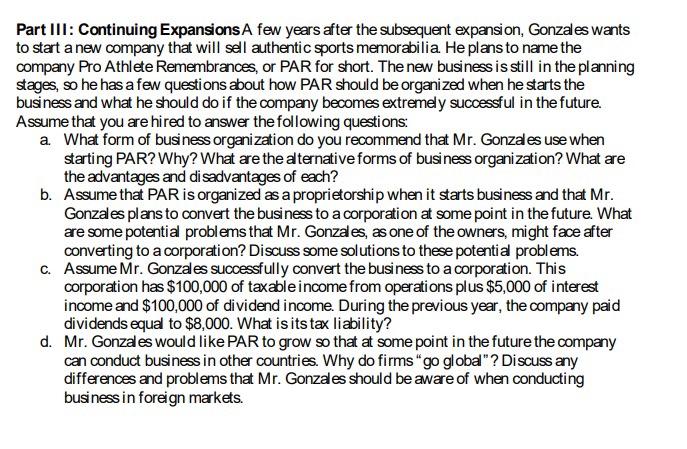ONLY PART "C" PLEASE

ONLY PART "C" PLEASE
Gonzales Food Store Gonzales Food Stores is a family-owned grocery store chain headquartered in El Paso. However, the owner doesn't know much about business. As a result, you are hired to make recommendations concerning financing needs for the following situations. Part 1: Initial Expansion Gonzales is a dosely held corporation considering a major expansion. The proposed expansion would require the firm to raise $10 million in additional capital. Because Gonzales currently has 50 percent debt and because the family members already have all their funds tied up in the business, the owners cannot supply any additional equity, so the company will have to sell stock to the public. The family wants to ensure that it will retain control of the company. This offering would be Gonzales's first stock sale, and the owners are not sure exactly what would be involved. For this reason, they have asked you to research the process and to help them decide how to raise the needed capital. In doing so, you should answer the following questions: a Is the stock of Gonzales Food Stores currently publicy held or privately owned? Would this situation change if the company undertook a stock sale? What are the disadvantages and advantages of going public? b. What are the advantages to Gonzales of financing with stock rather than with bonds? What are the disadvantages of using stock? What are the factors that afirm should consider when deciding whether to issue long-term debt, short-term debt, or equity? c. What is classified stock? Would Gonzales find any advantage in designating the stock currently outstanding as founders' shares? What type of common stock should Gonzales sell to the public to allow the family members to retain control of the business? d. If some members of the Gonzales family wanted to sell some of their own shares to diversify at the same time that the company was selling new shares to raise expansion capital, would this choice be feasible? Part II: Subsequent Expansions A few years after the initial expansion, Gonzales wants to build a plant and finance an operation that would manufacture and distribute its homemade salsa and related products to supermarkets throughout the United States and Mexico. Mr. Gonzales, CEO and family head, has begun planning this venture, even though construction is not expected to begin until the current expansion is complete and the company is financially stable, which might take several years. Even so, Mr. Gonzales has some ideas that he would like you to examine. The project's estimated cost is $30 million, which will be used to build a manufacturing facility and to set up the necessary distribution system. Gonzales tentatively plans to raise the $30 million by selling 10-year bonds, and its investment bankers have indicated that the firm can use either regular or zero coupon bonds. Regular coupon bonds would sell at par and would have annual payment coupons of 12 percent; zero coupon bonds would also be priced to yield 12 percent annually. Either bond would be callable after three years, on the anniversary date of the issue. As part of your analysis, you have been asked to answer the following questions: a Suppose Gonzales issues bonds and uses the manufacturing facility (land and buildings) as collateral to secure the issue. What type of bond would this security be? Suppose that instead of using secured bonds, Gonzales decides to sell debentures. How would this choice affect the interest rate that Gonzales would have to pay on the $30 million of debt? b. What is a bond indenture? What are some typical provisions that the bondholders would require Gonzales to include in its indenture? C. Gonzales's bonds will be callable after three years. If the bonds were not callable, would the required interest rate be higher or lower than 12 percent? What would be the effect on the rate if the bonds were callable immediately? What are the advantages to Gonzales of making the bonds callable? d. At the time of the bond issue, Gonzales expects to be an A-rated firm. Suppose the firm's bond rating was (1) lowered to BBB or (2) raised to AA. Who would make these changes, and what would they mean? How would these changes affect the interest rate required on Gonzales' new long-term debt and the market value of Gonzales' outstanding debt? Part III: Continuing Expansions A few years after the subsequent expansion, Gonzales wants to start a new company that will sell authentic sports memorabilia He plans to name the company Pro Athlete Remembrances, or PAR for short. The new business is still in the planning stages, so he has a few questions about how PAR should be organized when he starts the business and what he should do if the company becomes extremely successful in the future. Assume that you are hired to answer the following questions: a What form of business organization do you recommend that Mr. Gonzales use when starting PAR? Why? What are the alternative forms of business organization? What are the advantages and disadvantages of each? b. Assume that PAR is organized as a proprietorship when it starts business and that Mr. Gonzales plans to convert the business to a corporation at some point in the future. What are some potential problems that Mr. Gonzales, as one of the owners, might face after converting to a corporation? Discuss some solutions to these potential problems. C. Assume Mr. Gonzales successfully convert the business to a corporation. This corporation has $100,000 of taxable income from operations plus $5,000 of interest income and $100,000 of dividend income. During the previous year, the company paid dividends equal to $8,000. What is its tax liability? d. Mr. Gonzales would like PAR to grow so that at some point in the future the company can conduct business in other countries. Why do firms "go global"? Discuss any differences and problems that Mr. Gonzales should be aware of when conducting business in foreign markets











